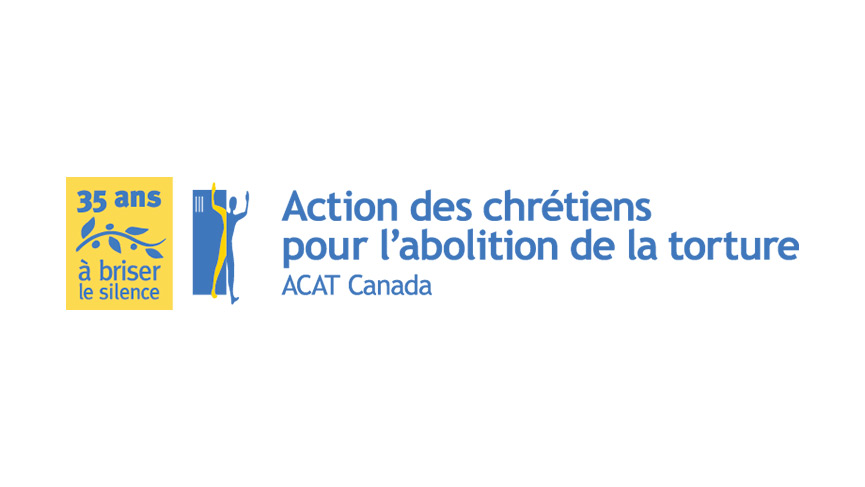ACAT, a loudspeaker for those with no voice

Montreal
ACAT, Action by Christians for the Abolition of Torture, will soon be celebrating the 35th anniversary of its activity in Canada. Coordinator Nancy Labonté offers a portrait of this organization its advocacy efforts for the respect of human dignity in its many dimensions.
Torture, a crime against humanity
In concrete terms, ACAT raises awareness and sounds the call to action concerning the issue of torture. The organization’s advocacy efforts include taking on government authorities, providing support to victims, as well as offering human rights education in schools, communities and ministries, etc.
When we talk about torture, as Nancy Labonté describes the situation, we imagine unsanitary and inhumane prison conditions in Ghana or Burundi. And though this is part of it, the spectrum is even broader: "The decisive factor is the presence of a government agent who knows about the situation and does nothing," she explains. State complicity is required.
"When violence occurs in a private situation – take for example domestic violence - the state would either have to authorize the violence or choose not to intervene," in order for the situation to qualify as an instance of torture. "Our upcoming monthly newsletter will address domestic violence, because there have been nine femicides in nine weeks in Quebec... We will trace the links between violence occurring in private and the responsibility that the public sphere" should assume in terms of taking action, especially in the "specific circumstances of the health crisis, thanks to which there is really no help accessible to the public" in reference to this issue.
ACAT works with international law, "reminding the authorities of their international commitments." In all cases, torture is absolutely prohibited, "even if someone has not signed the Convention against Torture. It is a crime against humanity."
In addition, "detention" facilities are monitored: this means prisons, but also psychiatric hospitals and CHSLDs. Adds Ms. Labonté, "Our attention has also been directed to situations of COVID-19 outbreaks."
I was a stranger and you welcomed me (Mt 25:35)
ACAT is also working on the non-refoulement principle forbidding refusal on the part of a state to permit entry through its borders to an asylum-seeker arriving from a country where he or she has been tortured. Canada should respect this principle, but it does not always honour its international commitments: "In fact, Canada is a great human rights offender, even if it doesn't appear that way. But it's there in small ways, as when vulnerable people find themselves in situations with no way out," says the coordinator.
Not that the situation is any worse here than elsewhere, but ACAT's mission is to shed light publicly on all these examples and to challenge the authorities: "The point as a civil society is to constitute a counterbalance to government: to say, we know about it, we are aware of it, you can’t hide it, and we don't agree; it's against the Convention.’’
She cites the example of women who were transferred from Maison Tanguay to the Leclerc detention centre in Laval, "an outdated, vermin-infested building." Ms. Labonté continues, "Sometimes I'm a little embarrassed to say that Canada is being accused of not respecting its international commitments [...] but if nobody talks about it, it will go on. It is essential that the public be informed of this and oppose it in some way. That's what human rights NGOs are for, to act as loudspeakers.’’
A deeply spiritual dimension
ACAT watches over the dignity of all persons. The spiritual dimension forms an important aspect, according to Ms. Labonté. Four times a year, the organization puts on a small celebration of the Word with the focus on social justice. ACAT has an ecumenical Christian identity which is in harmony with international law and efforts to uphold profound human values that are also integral to the Christian faith: "We were quite surprised to see [...] that the majority of people are here because it is a Christian organization." And this spiritual aspect resonates on a broader basis with the larger community.
A report on Canada at the UN
In collaboration with FIACAT – International Federation of ACATs - which enjoys Consultative Status with the UN, ACAT Canada recently submitted to the UNHRC an alternative report on Canada's shortcomings. "It is a somewhat abridged compilation of Canada's failings related to the prohibition of torture and non-refoulement, etc., in order to assist the Committee's experts in asking Canada the right questions.’’ These alternative reports constitute the voice of civil society at the UN, explains Ms. Labonté.
Concrete action?
Asked whether this is a good way to get involved with the various organizations working for human rights, Ms. Labonté answers, "Get a subscription to our newsletter and read it; find out what's really going on."
View their webpage and subscribe to their newsletter by visiting: https://acatcanada.ca/

Comment
Comment
Add new comment